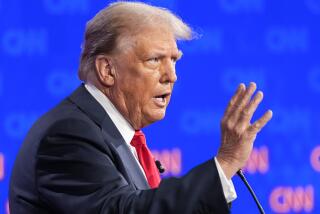New Yorker: Romney like guy speaking at a ‘50s Rotary luncheon
A New Yorker magazine profile of Mitt Romney out this week depicts the Republican presidential candidate as an earnest public servant, but one who is too steeped in the world of finance and private investment to communicate effectively with average voters.
“He talks to voters businessman to businessman, on the assumption that everybody either runs a business or wants to start one,” writes Nicholas Lemann. “Romney believes that if you drop the name of someone who has built a very successful company — Sam Walton, of Wal-Mart, or Ray Kroc, of McDonald’s — it will have the same effect as mentioning a sports hero. … He sounds like someone speaking at a Rotary Club luncheon in the nineteen-fifties.”
Even Romney ally Clayton Christensen, a Harvard Business School professor, concedes his friend’s inability to talk effectively about himself, saying “the neuron can’t get across that synapse” in such conversations.
PHOTOS: Mitt Romney’s campaign gaffes
A Barry Blitt cartoon of Romney — coming to America’s rescue on a chauffeur-driven white horse — illustrates the New Yorker cover. Blitt’s caricature of Barack and Michelle Obama as 1960s-style armed revolutionaries created a stir in the last election.
The Lemann article explains Romney as “a product of a series of interconnected, tightly enclosed worlds, with their own rules: Mormonism, business school, management consulting, private equity.”
While his auto executive father, George Romney, was “an organization man,” the Lemann portrait paints son Mitt as a “transaction man” (the title of the article) who sees government and business as a series of organizational challenges to be solved.
Coming off the financial collapse of 2007-08, though, many Americans have an inherent distrust of the big shakers of commerce. Writes Lemann: “Because Mitt Romney is incapable of explaining his career in a way that makes it sound admirable to people who aren’t in business, the country, for now, is directing at him its very mixed feelings about the financialization of the American economy.”
The New Yorker article is by no means a hit piece, giving Romney ample space to explain how he differs with Obama and what he would do if elected. If he behaved as he did as governor of Massachusetts, he would approach the presidency like a non-ideological problem solver.
“He saw his major initiatives as exercises in problem-solving, not as expressions of lifelong convictions,” Lemann writes. “Or one could say that the process itself—identify the problem, analyze the data, kick around solutions until the best one emerges, lead—is his conviction, not the principle involved.”
Romney’s supreme confidence in his management abilities, Lemann argues, is matched by a gaping deficit in conveying that to Americans.
“He combines an utter confidence in his ability to fix anything with an utter lack of confidence in his ability to explain to people what he intends to do,” Lemann writes, “which is why he appears so stiff and so unspecific in talking about his prospective Presidency.”
With doubts expressed even by supporters like Christensen, the New Yorker profile doesn’t hold out tremendous hope that Romney will correct this failing over the six weeks before election day.
INTERACTIVE: Battleground states map
Follow Politics Now on Twitter and Facebook
Twitter: @latimesrainey
MORE COMMENTARY FROM JAMES RAINEY:
Rush Limbaugh discovers another left-wing plot that isn’t
The truth behind the ‘Khalidi video’ and why it’s not for sale
Vanity Fair’s Michael Lewis admires fellow writer named Obama
More to Read
Get the L.A. Times Politics newsletter
Deeply reported insights into legislation, politics and policy from Sacramento, Washington and beyond. In your inbox three times per week.
You may occasionally receive promotional content from the Los Angeles Times.











